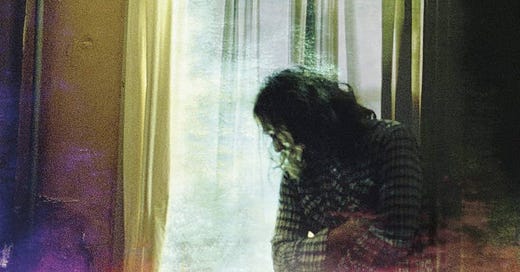On ‘In Reverse’, the closing track of The War on Drugs' 2014 album Lost in the Dream, singer Adam Granduciel serves up a reflective and evocative conclusion to the album's exploration of introspection and the human condition. The band’s third album was hailed as a pivotal work in the band's discography at the time, blending elements of rock, Americana, and even ambient music to create a nostalgic and forward-looking soundscape. The passing decade has done nothing to diminish its stature.
The nearly eight minutes of ‘In Reverse’ stands out, even when compared to the other nine tracks, for its emotional depth and intricate composition. The track begins with a subdued, melancholic melody that gradually builds into a crescendo of lush instrumentation, including Granduciel's signature guitar work, atmospheric synthesisers, and a poignant harmonica outro. In starting in this fashion, it begins in the same way the opening track ‘Under The Pressure’ ends — with that gentle feedback and comes to us rather than washing away. The two songs are Yin/Yang, literal bookends for the album.
It is in keeping with the album’s whole Bruce Springsteen in Ibiza vibe that permeates the record. The record is not a rehashing or retelling of the classic rock story, more like a half-remembered fever dream of what that might be like. The song's arrangement, with its gradual build and release, the waves coming in closer, mirrors the album's thematic content, which delves into themes of loneliness, existential angst, and the search for meaning amidst the chaos of life. The songs gently build up to just after the three-minute mark when the full band come in, and the rhythm section takes the ball and runs with it, and it sounds much more like classic rock from the previous century, designed to be heard driving down a freeway.
Lyrically, ‘In Reverse’ reflects Granduciel's introspective songwriting style, with lines that evoke a sense of longing and a desire to find solace in a tumultuous world. The lyrics continue to mull and wrestle with internal conflicts and emotional turmoil that stretch across the album’s runtime. The song's title itself suggests a contemplation of the past and a questioning of the path forward, themes that resonate throughout Lost in the Dream.
The recording process of the record was marked by Granduciel's meticulous attention to detail and his pursuit of a specific sonic landscape. The album was recorded over a two-year period, with Granduciel experimenting with various sounds and arrangements to achieve the desired effect. The result is a rich tapestry of sound that envelops the listener, with ‘In Reverse’ serving as the emotional apex of the journey that sweeps through similar-length epics like ‘Under The Pressure’ and ‘An Ocean In Between The Waves’.
Granduciel has said;
“In Reverse” is one song that’s surprises me I wrote it. It’s one of those things that came about from mixing and arranging. At the last minute I started changing the song around. Now it’s a unified piece I can’t believe I f*cking put this together. I really can’t. It’s awesome. It gives me hope for my future musical endeavors. It was a last minute visualization of the song in terms of the arrangement, so to perform it now as if that’s how I wrote is pretty funny, but amazing too.
Live performances of ‘In Reverse’ have further elevated the track's stature, with Granduciel and his band bringing an intensity and immediacy to the song that transcends the studio version. Fans and critics alike have lauded these performances, noting the live rendition's emotional resonance and transformative power. Played more than 200 times live in the last decade, typically as a main set closer or final closing song. I didn’t see the band at Glastonbury in 2014, but I do remember they were on early in the Friday afternoon, and as we were flitting between stages, the sun came out for the first time that weekend as their songs floated through the Somerset air.
Lost in the Dream as a whole reflects Granduciel's personal struggles with anxiety and depression, making ‘In Reverse’ a poignant conclusion to an album steeped in emotional turmoil. The song and the album at large have been lauded for their ability to capture a sense of universal longing and the search for meaning amidst uncertainty. Fitting the idea of an unresolved thought or question not answered, it fades out quicker than it came in, without a grand flourish; there are no fireworks or theatrics; at one point, the song is still going, and then it is not, inviting us to go back to the start and hit play again.





Great album, great song. In Reverse is the last track on Live Drugs too, natch. They are fantastic live. We’re due for a new album.
Great write-up of a great closer on a great album.